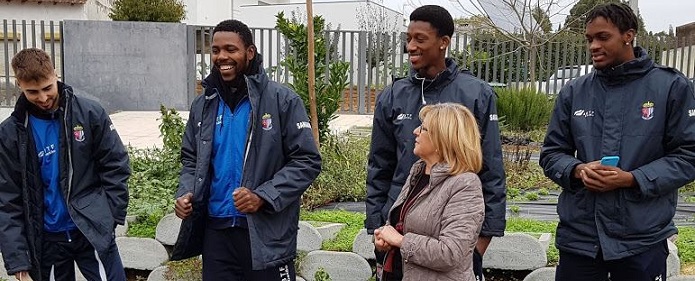
Student Athlete Network is boosting the employability and career prospects of young UK basketball players with the help of Erasmus+ funding.
The Essex-based organisation applied for vocational education and training (VET) learning mobility support after seeing the success of other projects in the sports sector, such as those organised by League Football Education.
Having been awarded a €56,000 grant, Student Athlete Network used the money to improve the vocational training and development of 18 and 19-year-old male basketball players who had recently graduated from the Advanced Apprenticeship in Sporting Excellence (AASE) Basketball programme in the UK.
Three young players were sent on one-year placements to play with clubs in Portugal.
Limited opportunities
Student Athlete Network’s project co-ordinator, Lloyd Gardner, explained how the project aimed to help young UK-based basketball players overcome the limited opportunities available when pursuing a professional career.
“There’s not a lot of professional opportunities for students coming out of education,” he said.
“One route is to go to the United States and train professionally, which some students pursue, but it isn’t ideal for everyone. In addition, the professional league in the UK only has 11 teams; very few of those will take on school leavers and either give them a contract or allow them to be part of the team.”

As a result, students alternatively go to university and find a lower-level team, which doesn’t always give them access to services they need to progress their basketball career. Therefore, Student Athlete Network decided to apply for funding to create enriching placements for their learners.
Working with Sunlive, a partner in Portugal, Student Athlete Network arranged for all three learners, Zak-Blue Shagourie, Pierce Maslen and Wesley Oba, to join basketball clubs in the area of Sangalhos.
“They would practice with the clubs and participate in social activities with the players within their teams,” said Lloyd. “Then they would be involved with the off-court activities, such as coaching younger students within the junior teams or taking part in activities to boost attendance at the games.”
All three followed a strengthening and conditioning programme, whilst also undertaking individual work on their technical and tactical development. This, in turn, gave them access to new opportunities and employment routes.
Boosting employability
Shortly after their placements, two of the players, Zak and Wesley, successfully gained scholarships in the US, while Pierce is currently studying at university and keen to explore future opportunities to play professionally in Portugal.
“The year improved their skills on the court which has helped them access a pathway to the US which wasn’t available to them beforehand,” said Lloyd. “Also, if they choose to finish university and potentially look for a professional career at that point, this experience will help them because teams in Portugal are aware of them now.”
I think it’s separated us and really established our brand and our ability to help students in all different forks of the path.
During the time spent with their host clubs, all three were able to develop soft skills and experience new cultures as well as improve their technical skills.
“I think, overall, that cultural experience and life skills are probably more valuable than the technical and tactical development,” said Lloyd.
Continuous communication
Student Athlete Network’s partnership with its partner Sunlive was one focused fully on continuous communication.
“We would regularly catch-up, having weekly conversations to check in on the players to make sure everything was okay from their perspective.
“At an organisational level, we’d have those conservations with the host clubs. Josh, our contact from Sunlive, was able to go to practices, watch the players and converse with the coaches directly about the players’ development.”
This framework enabled the partnership to quickly identify any issues and resolve them.
“For example, one of the players wasn’t particularly happy with his role in his initial host club,” said Lloyd. “We were able to move him to a different club halfway through the year where he was able to get more playing time and he enjoyed the situation a lot more.
“That wouldn’t have been possible without Josh there all the time and having that relationship where I can speak with him and the players directly as well.”
This first experience of Erasmus+ funding has also benefitted Student Athlete Network as an organisation.
“I think it’s separated us and really established our brand and our ability to help students in all different forks of the path, depending on their personal situation, whether they want to go into education or not,” said Lloyd.
“For us to be able to offer the chance for these athletes to go into professional club environments, without having to sign a professional contract - that’s an incredible opportunity. I don’t know how they would do it without Erasmus+.”
Read more Erasmus+ VET stories by visiting our theme-specific webpage!
